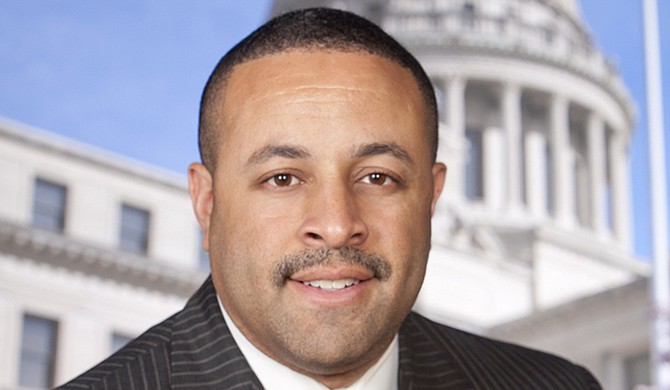State Rep. Chuck Espy, D-Clarksdale, wants Gov. Phil Bryant to hold a special session to require all law enforcement officers in the state to wear body cameras. Photo courtesy Mississippi House of Representatives
In recent years, special sessions of the Legislature have been used to cut deals on pet projects of the governor—typically some form of corporate tax giveaway to lure a potential employer.
State Rep. Chuck Espy, D-Clarksdale, wants Gov. Phil Bryant to call a special session for a different kind of incentives package. Yesterday, Espy called on Bryant to hold a special session to require all law enforcement officers in the state to wear body cameras.
In a news release, Espy said events in Florida, Missouri, New York and South Carolina highlight the importance of body cameras.
In July 2014, New York City policeman Daniel Pantaleo killed Eric Garner, 43, with a chokehold. In August 2014, Ferguson, Mo., officer Darren Wilson shot and killed Michael Brown, 18, after an attempted stop. On Feb. 15, Miami Gardens, Fla., police officer Eddo Trimino shot and killed Lavall Hall, 25, during a domestic disturbance call. Most recently, North Charleston, S.C., police officer Michael Slager allegedly shot and killed Walter Scott, 50, after a routine stop. A cell phone video of the incident a bystander recorded and released has circulated widely on the Internet and Charleston authorities arrested Slager and charged him with first-degree murder.
"On the street, things aren't always clear. The body cameras will help law enforcement and the public minimize inconsistencies, which we know from other cities, have been a significant factor in lowering crime rates," Espy said in a statement. "We must make sure Mississippi is a leader when it comes to crime suppression, constitutional policing, and reducing violent confrontations."
Espy introduced a body-camera bill during the legislative session, but it died in the House Judiciary B and Appropriations committees. Last month, the Hinds County Sheriff's Office bought body cameras for all of its deputies with drug-seizure money. Chief Lee Vance of the Jackson Police Department said he's open to body cameras but that the department would likely need external funding to pay for them.
"Our community, and in particular the black community, has asked for openness in all levels of government, and that includes policing efforts," Espy said. "At a time when there are cameras on highways, streets, in stores, in schools and countless other places, body cameras allow the version of events to present themselves in the most transparent way. Mississippi should lead the nation on this initiative because of the state's inequitable past. We have something to prove to this nation, and we can't wait for a senseless death to make us react."
Espy said the body camera legislation could be tacked on to a special session for a workforce training that Gov. Bryant suggested he might call.
Nicole Webb, a spokeswoman for Bryant, told the Jackson Free Press that the governor does not plan to call a special session for body cameras.



Comments
Use the comment form below to begin a discussion about this content.